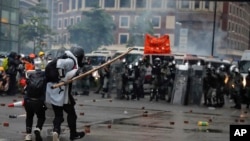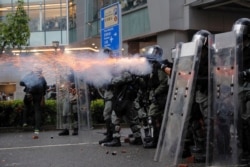Updated: August 26, 2019 4:13 p.m.
Hong Kong police on Monday blamed protesters for "escalating and illegal violent acts," while a group of pro-democracy lawmakers said it was police actions that were "totally unnecessary" after clashes at the 12th weekend of demonstrations.
A police statement said officers arrested 36 people. It also said one officer fell to the ground as protesters hurled objects at police, prompting six officers to draw their guns. One officer fired a warning shot skyward.
Lawmaker Andrew Wan said police had provoked protesters to occupy a road already blocked by officers, and that government and police actions during the weeks of protests have caused a "hatred among the people."
"I think the ultimate responsibility should be on the police side. That is what I observed," Wan said at a Monday news conference.
The vast majority of the thousands of protesters marched peacefully Sunday, but police at times fired bursts of tear gas at wildcat demonstrators who broke away from the largest groups. Officers also used water cannons for the first time in responding to protesters.
Some of the protesters threw bricks at police, attacked them with sticks and rods, and sprayed detergent on streets to make it slippery for police.
In France, leaders of the Group of Seven countries meeting in Biarritz backed Hong Kong's autonomy and called for "avoiding violence."
"The G-7 reaffirms the existence and the importance of the 1984 Sino-British agreement on Hong Kong," according to a joint statement, referring to a deal between Britain and China that calls for Hong Kong to be part of China, but autonomous.
British Prime Minister Boris Johnson told reporters that the leaders of the G-7 all expressed "deep concern" about the situation in Hong Kong.
The protests in Hong Kong are the biggest threat to peace in the Asian finance center since Britain handed over control of Hong Kong to China in 1997. The protesters say they are demonstrating against what they see as an erosion of rights under the "one country, two systems" arrangement under which Beijing assumed control of the territory.
Some demonstrators say they have resorted to violent tactics because the government has not responded to their demands. The weeks-long demonstrations in Hong Kong began with calls to stop an extradition bill, which has now been suspended, but have now expanded to include demands for full democracy.






